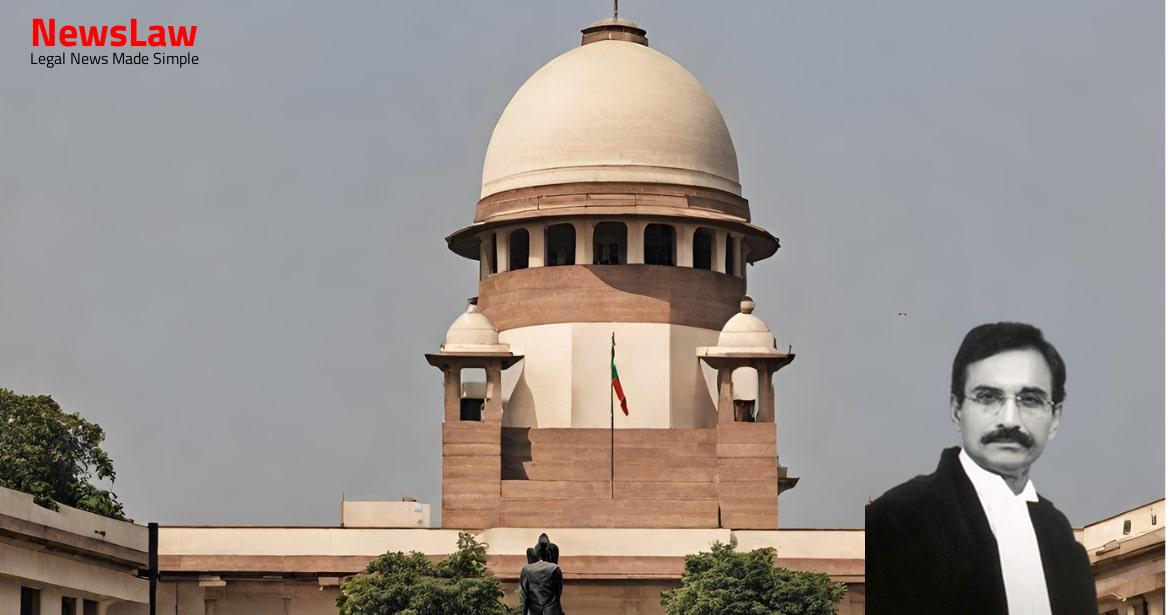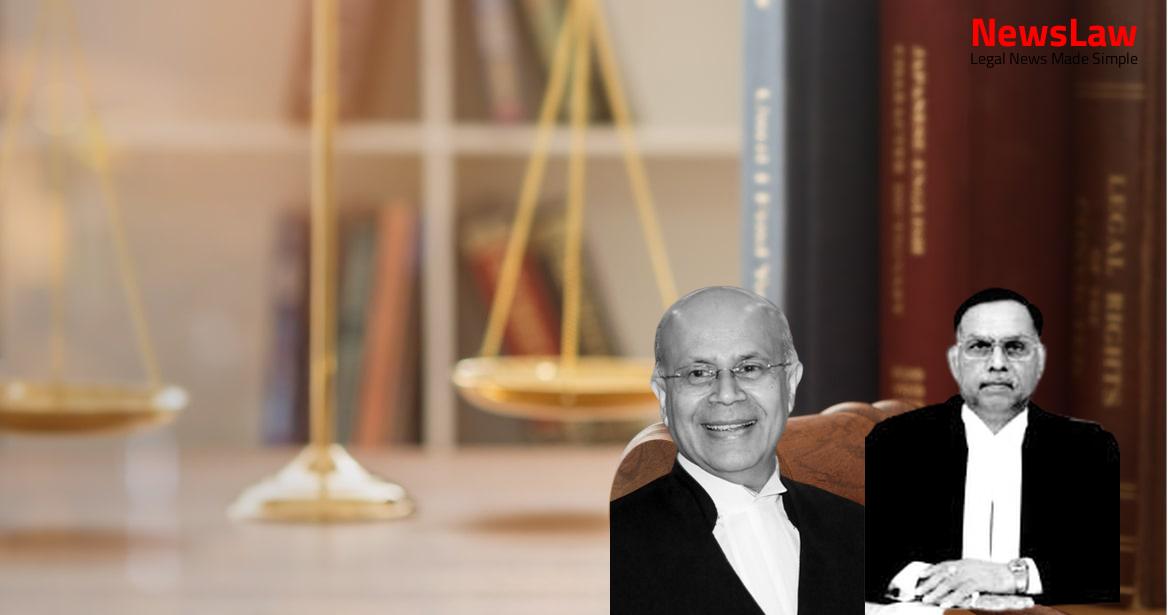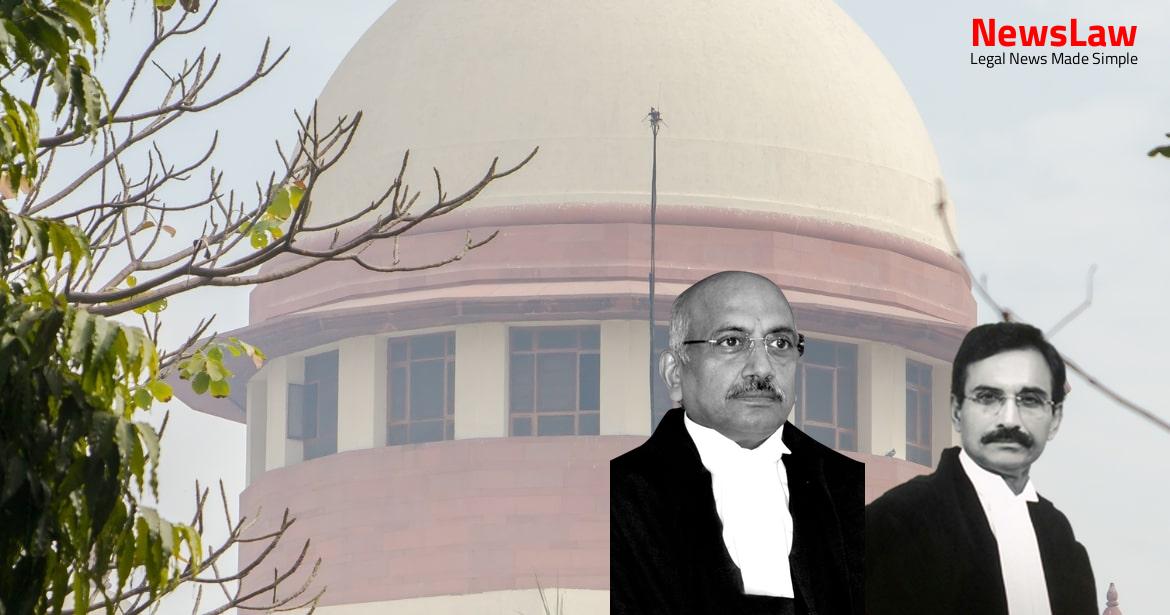A significant legal case before the Supreme Court of India involved a dispute over inheritance rights. The judgment addressed the entitlement of Kiran, a major unmarried daughter, to a share on partition of ancestral and joint family property. The case delved into the complexities of ancestral property distribution and raised questions on the interpretation of relevant legal provisions. Stay tuned to understand the implications of this ruling on property disputes in India.
Facts
- Late Shri Vithaldas filed a return under Section 12 of the Act on 02.10.1975.
- The land gifted to Kamla Devi, wife of Vithaldas, was wrongly excluded from the family account.
- The Sub-Divisional Officer passed an order on 07.05.1984 excluding land given to the elder daughters under the partition deed, totaling 31 acres and 29 guntas.
- After exclusion, the family unit was found entitled to hold 60 acres and 15 guntas.
- Ceiling Appeal No 59 of 1984 was filed by Vithaldas, his wife, and appellants 3 and 4, resulting in dismissal of the appeal and cross objections by the State.
- The total land held by Vithaldas post exclusion was 119 acres and 50 guntas, including land retained by the donor and allotted to the elder daughters.
- The declaration of surplus land was 111 acres and 39 guntas.
- Vithaldas and his wife challenged the order before the High Court, with appellants 1 and 2 as respondents.
- In the cross-objections reply, the contention regarding partition and allotment to the daughters was denied.
- The controversy revolved around the allotment of shares to Vithaldas’s two elder daughters.
- Vithaldas and his wife challenged the appellate order and filed a writ petition before the Bombay High Court, Nagpur Bench, which was dismissed in September 1987.
- The appeal filed by the appellants against the judgment of the High Court of Bombay was dismissed, upholding the view of the Learned Single Judge regarding the surplus land and partition deed.
- The Division Bench agreed that the partition deed alienating properties to minor daughters was unnatural under Hindu Law.
- The cultivation of land by Vithaldas was a crucial factor considered in the case.
- The High Court ignored a partition with the declarant’s mother through a registered partition deed dated 09.01.1970.
- The elder daughters of Vithaldas, found to be minors at the time of partition, were granted shares, but their age of majority before the relevant date was disregarded.
- The Court upheld the order of the Tribunal regarding the properties gifted to the second appellant and the two elder daughters.
- The issue of elder daughters not being parties in the cross-objections and the non-assailing of the Partition Deed by HUF members were raised but not accepted by the Court.
- An intra-court appeal was dismissed, affirming the decision of the High Court regarding the daughters’ share in the property.
Also Read: Supreme Court Judgment on Single Till Mechanism for HRAB Calculation: A Comprehensive Analysis
Issue
- The issue in the judgment is regarding the entitlement of Kiran, a major unmarried daughter, to a share on partition of ancestral and joint family property.
- The argument is made that Kiran, not being included in the concept of ‘Family unit’ under Section 4 of the Act, is entitled to a share that should be excluded in terms of Section 3(3)(i) read with section 4 of the Act.
- The judgment rejects this argument, stating that the point raised is to be rejected.
Analysis
- The Partition Deed dated 31.1.1970 was executed, dividing the ancestral land among Vithaldas and his minor son and daughters.
- The Partition Deed was registered before the cut-off date of 26.9.1970.
- The authorities did not have the right to question the partition that occurred before 26.9.1970.
- The Partition Deed allotted land to Vithaldas’ elder daughters, who were held to have no share in the HUF property at that time.
- The legal fiction created by the Amendment Act of 1972 aimed to nullify transfers made between 26.9.1970 and the commencement date of 2.10.1975.
- The Cross-objections filed by the State challenged the exclusion of land vested in the elder daughters by the Partition Deed.
- The Tribunal and subsequent authorities made findings in favor of the elder daughters based on the Partition Deed executed before the cut-off date.
- The legal heirs of Vithaldas carried forward the appeal proceedings after his demise, challenging the surplus land determination which included the ancestral property distributed in the Partition Deed.
- The Act imposes a maximum limit on the holding of agricultural land in Maharashtra.
- The Act provides for the acquisition and distribution of land held in excess of the ceiling.
- It also allows lands from undertakings to be maintained in compact blocks for efficient management through state-owned corporations.
- Chapter III of the Act includes provisions on restricting transfers and acquisitions.
- Section 8 restricts transfers of land held in excess of the ceiling area.
- Any transfer made in contravention of the Act can result in the forfeiting of the land to the Government.
- Section 10 outlines the consequences of transfers and acquisitions made in anticipation of or in contravention of the Act.
- Land possessed in excess of the ceiling area is deemed surplus land.
- In case of wilful contravention of Section 9, the land acquired can be forfeited to the State Government.
- Any transfers made after a specified date may be deemed to be avoid or defeat the objectives of the Amending Act.
- The Act defines ‘partition’ as any division of land made by act of parties, including through a court decree.
- Unmarried daughters were entitled to share on partition, but this right fell into disuse.
- Gifts made to daughters were sustained as provisions for the married couple.
- Hindu fathers were entitled to make gifts to daughters after marriage out of family property to a reasonable extent.
- Gifts made for pious purposes must be through an act inter vivos (between the living).
- Texts from Katyayana and Manu authorized gifts of immovable property by fathers to daughters.
- Fathers or widows are not legally bound to give property, but there is a moral obligation to provide a reasonable portion of family property as a marriage portion to daughters.
- Hindu law texts support giving property to daughters at partition or marriage and condemn dereliction of this duty.
- While there may not be a legal obligation, there is a moral duty for fathers to provide for daughters either at marriage or subsequently.
- Relevant dates in a legislation for deeming fiction cannot be expanded to an unlimited prior period of time.
- The judgment in Uttar Chand v. State of Maharashtra does not support the appellants’ case as it dealt with actual transfers made before the relevant date.
- In this case, there were no actual transfers but an attempted evasion through a partition dated 31-1-1970.
- The 7/12 extracts show that the fields in question were jointly cultivated by appellant No.1 and his daughters till 1975.
Also Read: Selection and Appointment of Judicial Officers in Himachal Pradesh
Case Title: VITHALDAS JAGANNATH KHATRI (D) THROUGH SMT. SHAKUNTALA ALIAS SUSHMA Vs. THE STATE OF MAHARASHTRA REVENUE AND FOREST DEPARTMENT
Case Number: C.A. No.-006006-006006 / 2009



